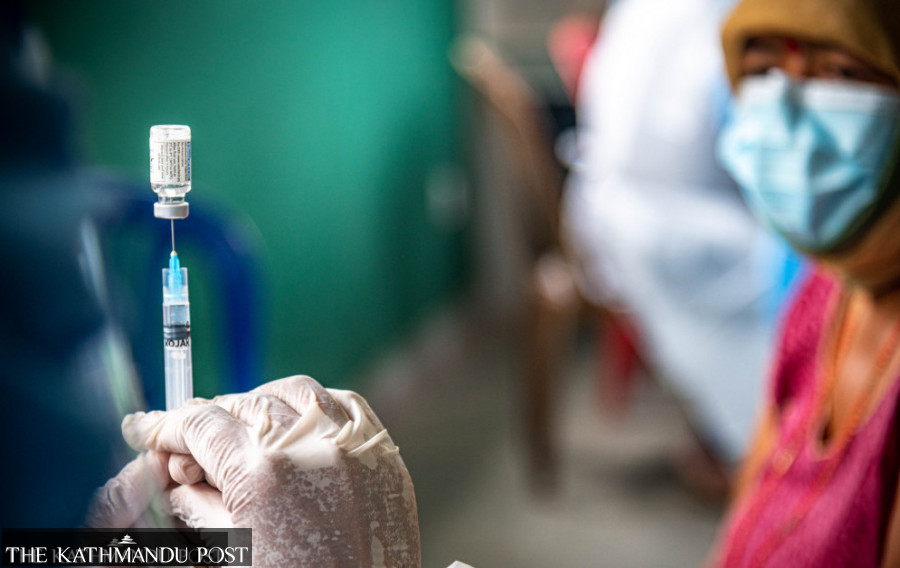Health
People urged to take booster shots as risk of new Covid surge grows
Ministry has decided to open second boosters to those above 55 and immunocompromised, drive yet to kick off.
Arjun Poudel
Amid concerns over a new Covid-19 surge in China and East Asian countries like Japan and South Korea, the Ministry of Health and Population has requested all people to take booster shots at the earliest.
Officials urged the general public to inquire with their concerned local authorities about the vaccines and get them if available.
“All rights to administer Covid-19 vaccine are with the local level,” said Dr Bibek Kumar Lal, director at the Family Welfare Division of the Department of Health Services. “Vaccine doses available to us have already been distributed to the local governments. We would like to request all the people to take booster shots.”
India has decided to conduct a mock drill for emergency response to deal with Covid-19 cases in hospitals all over India, on Tuesday. The country in October recorded BF.7, a sub-variant of Omicron which has been dubbed ‘ultra-infectious'. The fast-spreading BF.7 variant is a recombinant lineage between the Omicron sublineages BJ.1 and BA.2.75, and causes a spike in coronavirus cases.
The virus variant currently has been wreaking havoc in China, Japan and South Korea. Nepal has a high mobility rate with South Korea and Japan. Japan, on Saturday, recorded 177,622 new cases and 339 deaths. South Korea recorded 66,049 cases and 70 deaths the same day. China reported 24,128 new cases.
According to the Department of Immigration, in November alone, the number of arrivals from Japan was 955 while 1,015 left for the country from the Kathmandu airport. There were 1,670 arrivals from South Korea and 1,616 departures to the country from Kathmandu in the same month.
Health workers deployed to the health desk of Tribhuvan International Airport seek QR [quick response] codes or negative results of polymerase chain reaction tests before letting people into the country.
Doctors say that even the ones who are fully vaccinated and those who already have been administered booster shots and who also have QR codes can get infected with the virus and pass it on to others.
Issuing a statement on Saturday, the Ministry of Health and Population said that the BF.7 sub-variant has not yet been confirmed in Nepal, but urged the general public to take precautionary measures—wearing face masks, maintaining social distance, washing hands and avoiding crowds.
Of late, most people are shunning even such basic Covid safety measures as wearing face masks, maintaining social distance, and washing hands.
“Due to open borders and high mobility of people, there is a risk of the infection spreading,” reads the statement. “The public should be aware to control the contagion.”
Nepal and India share an open and porous border of over 1,850 kilometres and thousands of people enter each other’s countries every single day.
The Health Ministry recently carried out a whole-genome sequencing, which showed that at least 17 different sub-variants of the Omicron variant are circulating in the country right now.
According to the results furnished by the National Public Health Laboratory to the health ministry, BA.2, BA2.75, BA.2.75.1, BA.2.75.2, BA.2.75.3, BA.2.75.5, BA.2.75.6, BA.2.76, BA.5.2, BA.5.2.1, BM.1, BM.1.1.3, BN.1.3, BQ.1.1, BQ.1.2, By.1 and XBB sub-variants of Omicron have been found to be circulating in the country.
Whole-genome sequencing is a comprehensive method of analysing the entire DNA sequence of an organism’s genes. Researchers say that whole-genome sequencing of the coronavirus could be instrumental in tracking the severity—and properties—of the virus.
Nepal had started administering booster shots on January 17, but the uptake of the jabs is very low. So far, 7,972,791 people, or 27.3 percent of the total population, have gotten booster shots. It has been around a year since most people took them.
Several studies, including one carried out in Nepal, show that immunity achieved from vaccination or natural infection wanes after six months of vaccination or natural infection.
Health ministry officials have urged the public to take booster shots, but they are unaware of the number of vaccine doses in stock. The ministry has already decided to open second booster shots to those above 55 and the immunity-compromised but has yet to start administering them.
So far, 12,019 Covid-related deaths have been reported in Nepal, according to official count. The Health Ministry said that 22,324,933 people, or 76.5 percent of the total population, have been fully vaccinated.




 9.83°C Kathmandu
9.83°C Kathmandu















